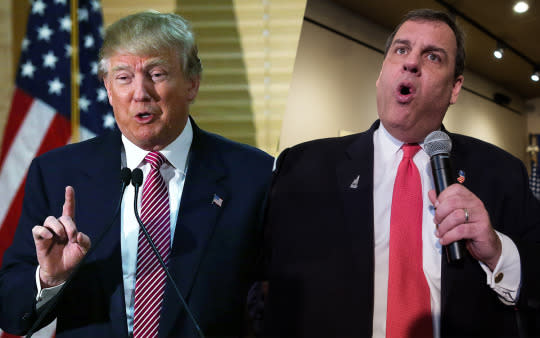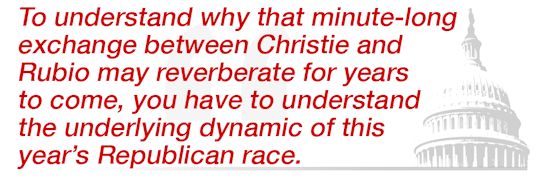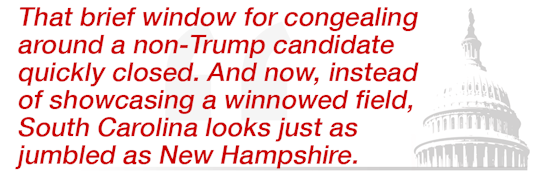If Trump wins, he has Christie to thank

Republican presidential candidate Donald Trump and New Jersey Gov. Chris Christie. (Photos: Paul Sancya/AP, Kayana Szymczak/Getty Images)
When Mitt Romney lost his presidential bid in 2012, a lot of senior Republicans blamed Chris Christie for cementing his defeat. At a critical moment that fall, you may remember, New Jersey’s governor had stood arm in arm with President Obama as they toured the wreckage of Hurricane Sandy, which seemed to undercut Romney’s entire argument about Obama being a divisive and incompetent leader.
In truth, it was pretty weak to blame Christie, given the litany of Romney’s shortcomings, not to mention the fact that Christie had a decimated state to govern and shouldn’t have been thinking about electoral votes at that moment anyway.
But if the field of Republican hopefuls not named Donald Trump remains overcrowded and hopelessly muddled after this weekend, and if Trump himself cruises to another victory in South Carolina and ends up winning the nomination, a lot of those same Republican leaders may look back and conclude that it was Christie who cost them a victory yet again.
And this time, they may actually be right.
Christie, of course, departed from the race last week, with uncharacteristic silence, after finishing a disappointing sixth in the New Hampshire primary. He didn’t go quietly, though. In his final debate, three days before the primary, the former prosecutor gave us the campaign’s most memorable moment so far, gleefully taunting Marco Rubio as the Florida senator tried in vain to repeat his scripted talking points.

Christie, you see, didn’t like Rubio’s attacks on his record, and as anyone could see in that moment, he doesn’t much like Rubio, either. Rubio is boyish, glamorous, politically malleable and beloved for his inspiring story — all things for which Christie has a healthy dose of contempt, if not perhaps a hint of envy.
Well, all right, you say. That was all very entertaining, but now Christie is out and Rubio looks to be at least somewhat resurgent, so it was really just a bump in the road, right?
Maybe. Except that one bump in the road, placed at a crucial intersection, can cause a major pileup.
To understand why that minute-long exchange between Christie and Rubio may reverberate for years to come, you have to understand the underlying dynamic of this year’s Republican race.
Trump’s support over the last several months, minus a few peaks and valleys, has basically hovered around or just over the 30 percent mark in the early primary states. That’s a sizable plurality of the vote, and it’s proved to be surprisingly unshakable, but it hardly makes him as dominant a figure in the party as his round-the-clock media coverage would suggest.
The problem for the governing wing of the party is that, when you add to Trump’s plurality the support for Ted Cruz and Ben Carson, more than half of this year’s electorate seems to be chiefly looking for a candidate who will blow up the status quo. And the rest of the Republican vote has been almost equally divided among an unusually populous group of eminently electable governing types.
My thinking several months ago, as I’ve written before, was that before the campaign got to the South, the party’s more traditional electorate and its leadership would have congealed around one or possibly two candidates, causing poll numbers to tighten considerably and making Trump look like far less of an imposing force.
Congealing is what establishments are good at. It’s pretty much what they exist to do.
And, for better or worse, that’s exactly what was about to happen the week before the New Hampshire primary. After a shaky few weeks, Rubio had exceeded expectations by finishing just a point behind Trump in Iowa. He arrived in New Hampshire with a gale force gust at his back, drawing something like 800 people and half the national media to a tiny theater in Exeter, where I watched him ignite the crowd with a mix of partisan fire and unscripted humor.
Though untested and sometimes unsteady, Rubio is the closest thing the fractured party has to a consensus candidate (except maybe among the hardcore, anti-immigration crowd), and at that point his campaign had taken on real momentum. Driving around New Hampshire in those first few days after Iowa, I expected Rubio would surge solidly into second place, and I didn’t discount the possibility that he could end up surpassing Trump.
Had that happened, my guess is you would have seen the party’s donors and elected leadership close ranks pretty quickly. There would have been enormous pressure on Jeb Bush and John Kasich to follow Christie out the door. The South Carolina primary, devised in the 1970s to give the new establishment of Southern and Western Republicans a firewall against apostates, would have been reduced essentially to a three-man race.
But then Christie came to his final debate looking to inflict the same kind of damage he’d suffered, and within a few minutes Rubio was basically in the fetal position at center stage, begging for a commercial break. The clip went viral. For a few days, Rubio dropped faster than the Tower of Terror at Disneyland; he finished fifth, just behind his old mentor, Bush.
That brief window for congealing around a non-Trump candidate quickly closed. And now, instead of showcasing a winnowed field, South Carolina looks just as jumbled as New Hampshire.
Four years ago, South Carolina was a race between the establishment favorite, Romney, and three insurgent candidates — Newt Gingrich, Rick Santorum and Ron Paul — who were all vying to emerge as the anti-Romney. (Gingrich ultimately won, but not by enough to derail Romney.)

This year looks almost like a reverse image. Now it’s Trump with a commanding lead and Cruz consolidating evangelical support, while three governing candidates — Rubio, Kasich and Bush — battle to outlast one another.
The state’s popular governor, Nikki Haley, endorsed Rubio this week, which is a major seal of approval for him (especially after the former president, George W. Bush, worked her over for Jeb). But Haley is only the third of 31 Republican governors to swing behind one of the current candidates.
Rather than having rallied around a clear favorite after New Hampshire, one of the most powerful blocs in the party remains perilously detached from the process, apparently afraid to end up on the wrong side of the Trump rebellion.
Unless one of the governing candidates surges late and finishes well above the others (and I wouldn’t be shocked to see Rubio do just that), chances are that the entire field will move on to the 13 states holding contests on March 1, while a helpless establishment looks on. And by the time those states vote, it’s quite possible that Trump’s nomination will have come to seem palatable or even inevitable to the majority of Republican voters.
There’s a long way to go before then. But if Trump wakes up March 2 and finds himself planning for what once seemed an unlikely convention, he should probably start thinking about Christie as a potential running mate.
It’s the least he can do for the man who inadvertently cleared his path.



